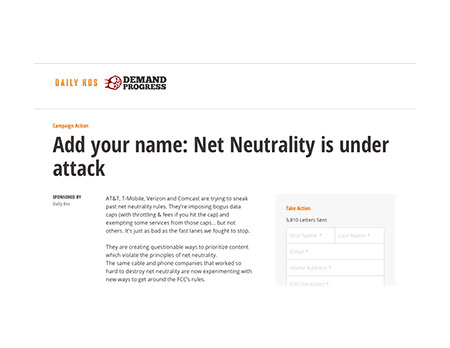From Zero to Anti-Hero
The smarter way to stay on top of the multichannel video marketplace. Sign up below.
You are now subscribed
Your newsletter sign-up was successful

Nonprofit group Demand Progress is looking to flood the Federal Communications Commission with complaints about zero-rating plans as the FCC considers how to treat those business models under its network-neutrality general-conduct standard.
The group has already concluded the zero-rating plans violate the rules. “We need to make sure the FCC knows we’re watching and sets the precedent that violating net neutrality has real consequences,” it said in a June 1 email solicitation that linked to an online form letter complaining to the FCC.
As a condition of its deal to acquire Time Warner Cable, Charter is forbidden to use zero-rating plans, and FCC chairman Tom Wheeler has signaled that the plans, at least in the context of that merger, are anticompetitive.
Demand Progress has advised its supporters to personalize its complaint form letter, but if the docket fills with comments that begin, “AT&T, T-Mobile, Verizon and Comcast are trying to sneak past net-neutrality rules,” it would be courtesy of the group’s one-stop-grousing online effort.
The FCC is currently vetting plans by Comcast, T-Mobile, Verizon and AT&T, but Demand Progress said it is mostly hearing from those companies and not others opposed to the plans.
Zero-rating plans are ones in which some services, particularly bandwidth-heavy video services, don’t count toward usage-based pricing caps (usage is not actually capped, but overages incur extra charges).
The FCC did not prohibit those under its net-neutrality rules, but under the general conduct standard can look at anything that potentially has an anticompetitive effect.
The smarter way to stay on top of the multichannel video marketplace. Sign up below.
Young Entrepreneur Builds an App to Find OTT ‘Budget Bundles’
Entrepreneurial 21-year-old Griffin O’Brien is out to help people put together the right mix of paid streaming services to get the television they want (and can afford) without having to go the full cable, telco or satellite TV route.
He’s working on a “Budget Bundle” app consumers could use to sift through 30 primary over-the-top options — too many options for anyone to keep straight in their heads. There are places to find streaming reviews but “a glaring gap” between the glut of services and the consumer’s ability to cut the cord or graduate from being a cord never to a smart streamer.
O’Brien — son of former Time Warner Cable executive and serial investor Dan O’Brien — is getting attention via social-sharing of a write-up on Facebook, where he’s taking signups for a newsletter, and he would like to launch the app, with some help on the business side from his brother Matt, in the next several weeks. He’s learning how to take his idea from a database to an actual, developed product (and looking into protecting the algorithm legally). He’s also starting a summer internship at Turner in Atlanta and has another year to go in college before he graduates.
If it all comes together, O’Brien said he could stay with it in the fall, saying, “I’m really passionate about the service and think it could become something really great.”
Millennials who are leaving college, and Hispanics, who are big consumers of streaming products, are potential key audiences, and advertising or referral payments from OTT providers are potential revenue sources, he figures.
— Kent Gibbons
ISPs Get an Indie Label
An independently funded searchable database of Internet provider data has produced its own broadband nutrition labels, using the form the Federal Communications Commission provided for ISPs who want to make sure they provide all the network-management and pricing info required under the agency’s net-neutrality rules.
Rather than relying on those ISPs to come up with their own individual labels, the groups did their own research to create labels for a host of providers and posted them online. “We really just wanted to create more transparency in a market where there is a lot of gray area for most consumers,” said Alex Harrison, content coordinator for Broadband Search.
The overall goal of the 10-month-old site is to “help consumers make the best, most-educated choice when searching for Internet and TV,” Harrison told The Wire. “Think a mixture of Kayak and Angie’s List but for Internet and TV providers.”
— John Eggerton
Contributing editor John Eggerton has been an editor and/or writer on media regulation, legislation and policy for over four decades, including covering the FCC, FTC, Congress, the major media trade associations, and the federal courts. In addition to Multichannel News and Broadcasting + Cable, his work has appeared in Radio World, TV Technology, TV Fax, This Week in Consumer Electronics, Variety and the Encyclopedia Britannica.

